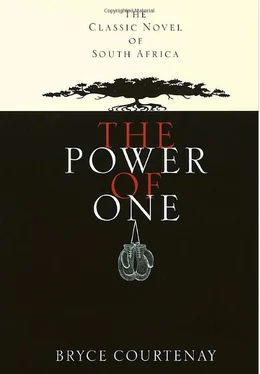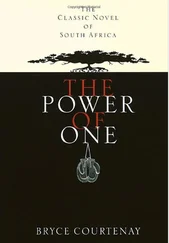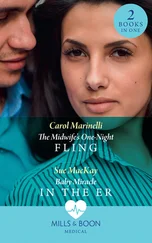Брайс Куртенэ - The Power of One
Здесь есть возможность читать онлайн «Брайс Куртенэ - The Power of One» весь текст электронной книги совершенно бесплатно (целиком полную версию без сокращений). В некоторых случаях можно слушать аудио, скачать через торрент в формате fb2 и присутствует краткое содержание. Жанр: Современная проза, на английском языке. Описание произведения, (предисловие) а так же отзывы посетителей доступны на портале библиотеки ЛибКат.
- Название:The Power of One
- Автор:
- Жанр:
- Год:неизвестен
- ISBN:нет данных
- Рейтинг книги:3 / 5. Голосов: 1
-
Избранное:Добавить в избранное
- Отзывы:
-
Ваша оценка:
- 60
- 1
- 2
- 3
- 4
- 5
The Power of One: краткое содержание, описание и аннотация
Предлагаем к чтению аннотацию, описание, краткое содержание или предисловие (зависит от того, что написал сам автор книги «The Power of One»). Если вы не нашли необходимую информацию о книге — напишите в комментариях, мы постараемся отыскать её.
The book is made to movie with the same name.
The Power of One — читать онлайн бесплатно полную книгу (весь текст) целиком
Ниже представлен текст книги, разбитый по страницам. Система сохранения места последней прочитанной страницы, позволяет с удобством читать онлайн бесплатно книгу «The Power of One», без необходимости каждый раз заново искать на чём Вы остановились. Поставьте закладку, и сможете в любой момент перейти на страницу, на которой закончили чтение.
Интервал:
Закладка:
Now I stood holding Doc’s music, staring down at the bottle of Johnnie Walker. Doc only ever drank in his room, why would he keep a bottle in his piano stool? If Klipkop hadn’t walked in at the moment he was about to tell me, everything would have been clear. I reached into my pocket for Doc’s note and read it again, maybe there was a clue I’d missed. I kept coming back to the last words… and whisky is getting easier not to have . Had I been older it wouldn’t have been a puzzle at all, but seven-year-olds are not very good at puzzles and usually know nothing about the drinking habits of grown-ups.
I wasn’t at all sure I was doing the right thing but the bottle was directly above the musical score Doc wanted and it was the only item in the piano stool which you could pour into a water flask. I was more than a little conscious that when I had last interfered with Doc’s whisky, the repercussions had been enormous. I took the water flask and the bottle of Johnnie Walker into the cactus garden where I dug a hole in the ground and planted the flask with its neck protruding. I must say it was a good plan and I spilled hardly any. After that I planted the bottle upside down. It was to be the last Johnnie Walker bottle planted in Doc’s cactus garden.
I returned the flask to the piano stool, placing Doc’s musical score over it. Then I locked the seat and put the key in my pocket.
I was waiting at Doc’s cottage by nine a.m. on Monday morning. Dee and Dum had cleaned everything and the place was spotless. The Steinway shone like a mirror, from a fresh coat of beeswax. The girls had spent an hour cleaning the whisky from the keys. Seated on the two piano stools, they had giggled fit to burst at the cacophony they made. I don’t believe they’d ever had a more enjoyable afternoon. They continued to clean Doc’s cottage every Sunday afternoon for the next four years, until I’m sure they believed it was their sabbatical home.
I passed the time waiting for Doc separating succulents and generally clearing weeds from a small part of the garden. After a couple of hours I heard the low whine of a truck and the less agonised sound of a light van as they made their way up the steep road to the cottage.
The black prison flat-top was a Diamond T. The van, coming along behind it, waited a little way down the road while the truck turned to face downhill again. On the back were six black prisoners and two warders carrying rifles. The driver and third warder sat in front. I recognised one of the warders as the young one who had let me into the prison on the previous Friday and I said hello. He jumped down from the back of the truck and stuck his hand out. ‘Gert Marais, hoe gaan dit ?’ I shook his hand and replied that I was well and, in the Afrikaans manner, enquired formally about his health. Just then the van drew up and I could see that Klipkop was driving and Lieutenant Smit was beside him. They stopped in front of the lorry and Klipkop jumped out. Walking to the rear of the van he unlocked it. To my surprise Doc stepped out. He was dressed in a clean white shirt, blue tie and his white linen suit. The place where his knee had torn through the trouser leg when the sergeant’s kick brought him to the ground had been mended, the suit had been washed and pressed and his boots shone. I had never seen him looking so posh. Lieutenant Smit and Klipkop both greeted me like an old friend.
I could see Doc was agitated and when Klipkop and Lieutenant Smit moved towards the house he turned to me urgently. ‘We must talk, Peekay, today is a very difficult thing for me to do.’ We followed the two warders into the cottage and Doc pointed to the Steinway and the stool. He was too preoccupied to notice the clean up and while I felt a little disappointed I said nothing.
Cleanliness wasn’t something I regarded too highly myself. Two of the other warders came in, leaving Gert and one other warder to mind the prisoners. Together with Doc they discussed how the Steinway might be safely moved.
Klipkop went to call the prisoners in and Doc turned to Lieutenant Smit and asked if he could go and look at his garden, as he couldn’t bear to see the piano being moved. Smit laughed and added that it was necessary to have a warder along. ‘I know Gert Marais. Can he come please?’ I asked. Lieutenant Smit shrugged his shoulders and signalled for Gert to come with us.
‘I can’t have you two escaping into the hills, now can I?’ he said jokingly. But I was to learn that Lieutenant Smit was a careful man and liked to play things by the book. Gert couldn’t speak English which meant Doc and I could talk without the danger of being overheard.
We walked in the garden, following the Johnnie Walker bottles as they meandered through the tall cactus and aloe. For a long time Doc said nothing, stopping to look at plants and bending down to examine succulents which grew close to the ground. It was as though he was trying to memorise the garden, to etch it on a plate in his mind so the memory of it would sustain him in his prison cell. At last we stopped and sat on a natural outcrop of red rock with our backs to the town below and looking up into the hills. Gert stood some little way away chewing a piece of grass, his rifle slung carelessly over his shoulder. He seemed happy to be away from his superiors.
Finally Doc started to talk. ‘Peekay, these domkopfs want I should do a recital in the town today. I have not played a concert since sixteen years, now I must play again. Peekay, I cannot do this, but I must.’
I looked up at Doc and I could see that he was terribly distressed. ‘You don’t have to, Doc. They can’t force you!’ I said defiantly but without too much conviction. My short experience with authority of any kind had shown me that they always won, they could always force you.
Doc turned to look at me. ‘Peekay, I love you more than my life. If I don’t play today they will not let you come to see me.’ I could feel the despair in his voice as he continued softly, ‘I do not think I could bear that.’ I hugged him and he patted my head and we sat there and looked at the hills dotted with the aloes in bloom and at the blue and purple mountains beyond them. At last he spoke again. ‘It was in Berlin in 1925. I had been ill for some months and I was coming back to the concert circuit with a concert at the Berlin Opera House. I had chosen to play –’ he turned to me – ‘the score you found in my piano stool. Beethoven’s Symphony Number Five is great music but it is kind to a good musician, the great master was a piano player himself and it is not full of clever tricks or passages which try to be schmarty pantz with the piano player. That night I played the great master goot, better than ever until the third movement. Suddenly, who knows from where it comes, comes panic. In my fingers comes panic, in my head comes panic and in my heart comes panic. Thirty years of discipline were not enough. The panic swallowed me and I could not play this music I have played maybe a thousand times when I practise and forty times in concert. Nothing. It was all gone. Just the coughing in the crowd, then the murmuring, then the booing, then the concert master leading me from the stage.’ Doc sat, his head bowed, his hands loosely on his knees. ‘I have never played in front of an audience again, not since this time in Berlin. Every night for sixteen years I have played the music, the same music and always in the third movement it is the same, the music in my fingers and my head and my heart will not proceed. It is then the wolves howl in my head and only whisky will make them quiet again. Today, in one hour, I must play that music again. I must face the audience or, my friend, I lose you.’
I cannot pretend to have understood the depth of Doc’s personal dilemma. I was too young, too inexperienced to understand his pain and humiliation. But I knew he was hurting inside and I knew there was nothing I could do to stop it. ‘I will be there with you, Doc. I will turn the pages for you.’
Читать дальшеИнтервал:
Закладка:
Похожие книги на «The Power of One»
Представляем Вашему вниманию похожие книги на «The Power of One» списком для выбора. Мы отобрали схожую по названию и смыслу литературу в надежде предоставить читателям больше вариантов отыскать новые, интересные, ещё непрочитанные произведения.
Обсуждение, отзывы о книге «The Power of One» и просто собственные мнения читателей. Оставьте ваши комментарии, напишите, что Вы думаете о произведении, его смысле или главных героях. Укажите что конкретно понравилось, а что нет, и почему Вы так считаете.












